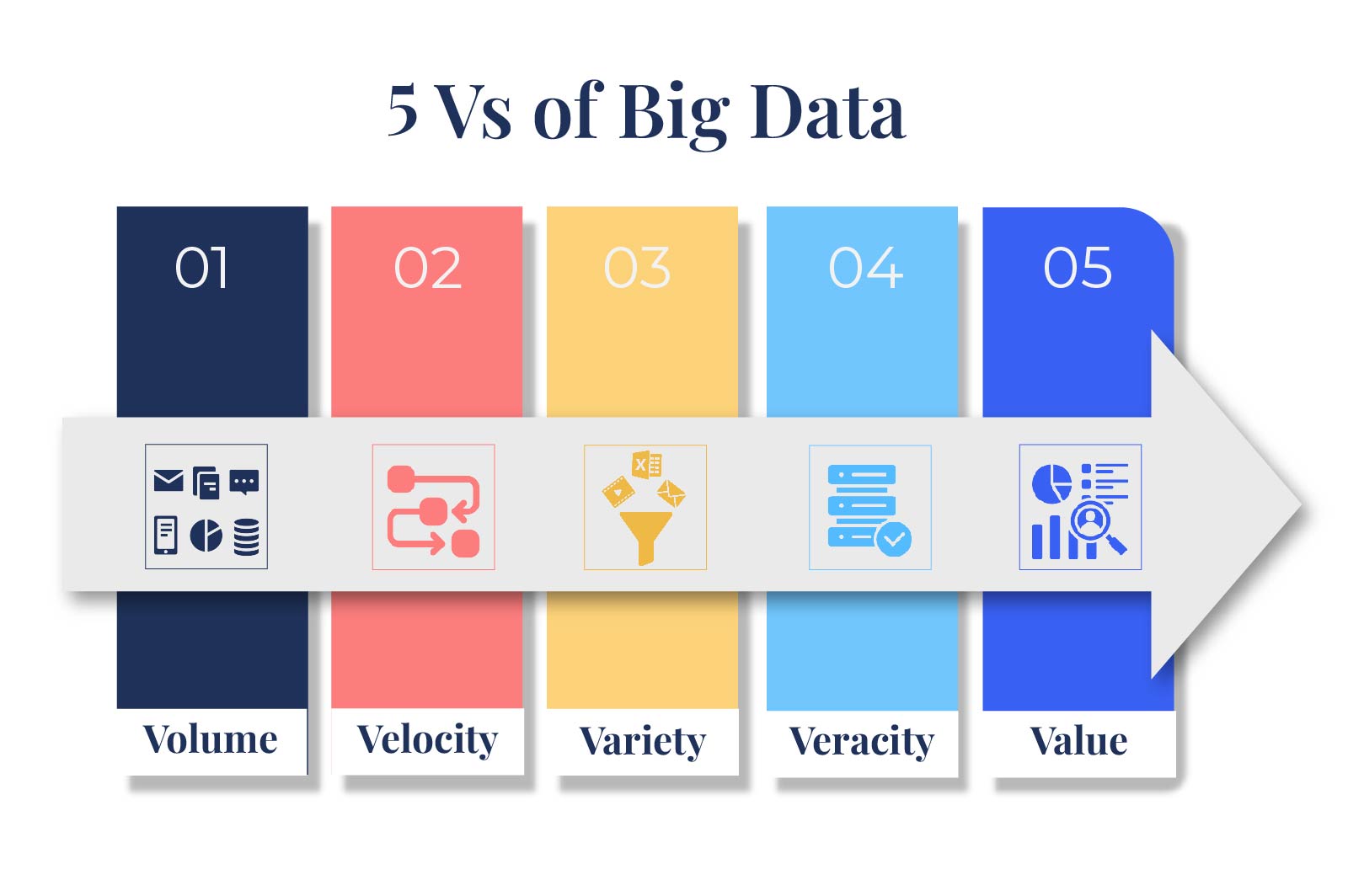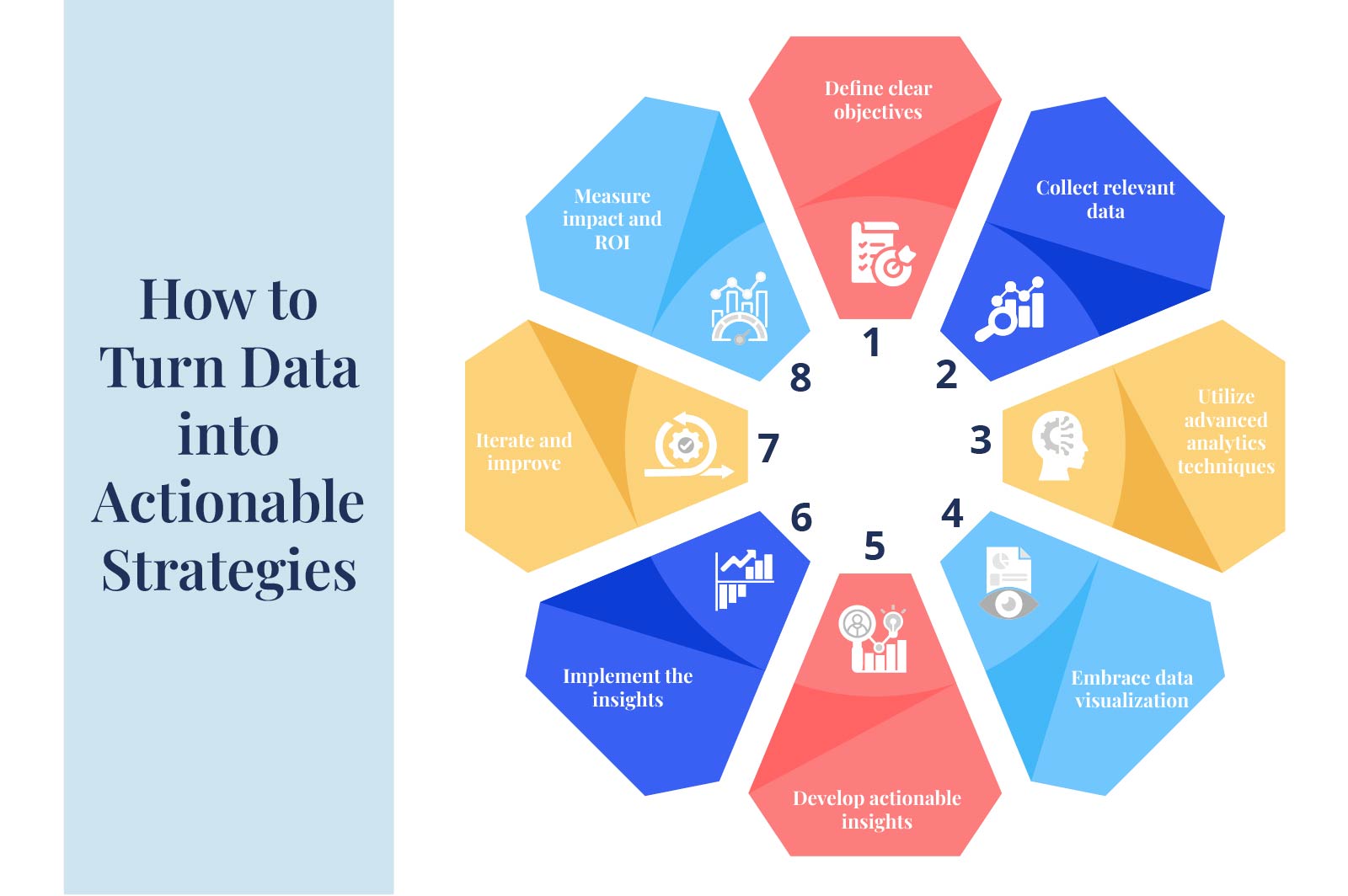Harnessing the Potential of Big Data: Key Insights for Success

Highlights :
In today’s digital era, data has emerged as an exceedingly valuable asset. As leading data analysts, we understand big data’s immense power and potential for businesses today. In this blog, we will explore key insights and strategies for harnessing big data’s potential for your organization’s success. We will also explore real-world examples and discuss the potential of big data for business success.
To start, let’s try to step back and understand better what big data exactly means:
What is Big Data?
The term “big data” describes vast quantities of data, which can be organized into structured, semi-structured, or unstructured formats. Big data is typically defined by the “5 Vs.”

- Volume:
The amount of data generated from various sources such as social media, sensors, devices, transactional systems, and more.
- Velocity:
The rapid influx of data to derive meaningful insights promptly.
- Variety:
Diverse data types and formats, including structured data (e.g. databases, spreadsheets), semi-structured data (e.g. XML, JSON), and unstructured data (e.g. text, images, videos).
- Veracity:
Refers to the quality and consistency of data, which can impact the reliability of insights.
- Value:
Refers to meaningful insights, actionable information, and tangible benefits that businesses can derive from analyzing large and complex datasets.
Now, the next question that comes to our mind is, how does Big Data create value for your business?
Power of big data for your business:
Businesses can harness vast volumes of diverse information from big data to make strategic, data-driven decisions that drive success and innovation. Big data can be leveraged to
- Uncover hidden patterns
- Identify trends
- Predict outcome
- Risk mitigation
- Optimize operations
- Improve customer satisfaction
- Gain other valuable information
- Stay ahead of competitors
As businesses continue to navigate an increasingly complex and competitive marketplace, leveraging the power of Big Data is crucial for sustainable growth and success. The ability to extract insights from Big Data is a game changer. So, how can businesses effectively turn data into strategies?
Here are some important steps to consider:
How to Turn Data into Actionable Strategies
As leading data analysts, we understand big data’s immense power and potential for businesses today. We follow specific key steps to turn data into actionable strategies, which are:

- Define Clear Objectives:
Before analyzing big data for a business’s success, it is crucial to define clear objectives and goals. Identify what you aim to achieve by analyzing this data, whether it is to gain an edge over your competition or improve your operation.
- Collect Relevant Data:
Quality data is the backbone of effective big data analytics. Ensure you collect relevant data from various sources, including internal databases, customer interactions, social media, and IoT devices. The data must be thoroughly cleaned and organized to achieve optimal accuracy and reliability. This entails removing any errors or inconsistencies and forming a clear and structured data set.
- Utilize Advanced Analytics Techniques:
Leverage advanced analytics techniques such as machine learning, predictive modeling, and data mining to extract hidden insights from large datasets. These techniques can uncover patterns, trends, and correlations that traditional analytics may overlook.
- Embrace Data Visualization:
Data visualization is a powerful tool for communicating insights and trends effectively. Use interactive charts, graphs, and dashboards to present complex data in a visually appealing and easy-to-understand format for stakeholders.
Read More: How to Choose the Right Chart for Data Visualization
- Develop Actionable Insights:
After visualizing and analyzing the data, the next important step is to develop insights from it to make informed decisions that drive success.
- Implement the insights:
After developing actionable insights, it is important to implement them and monitor their progress.
- Iterate and Improve:
Big data analytics is an ongoing process of iteration and improvement. Continuously evaluate and refine your analytics strategies, algorithms, and models based on feedback and new data to drive continuous improvement and innovation.
- Measure Impact and ROI:
Finally, measure the impact of your big data analytics initiatives by tracking key performance indicators (KPIs) and evaluating return on investment (ROI). Use data-driven insights to make informed decisions and drive business growth and success.
By following these key insights and strategies, businesses can unlock big data’s full potential and drive actionable insights, innovation, and competitive advantage in today’s data-driven world.
It is essential to regularly monitor critical metrics and KPIs to track the performance of your campaigns. Identify trends, anomalies, and opportunities for optimization. Make data-driven adjustments in your digital marketing campaign to improve results over time.
Case Study:
Let us take an example of how a leading software company established itself as a prominent player in the industry using big data. Despite efforts, they struggled to see an increase in conversions despite significant investments. They searched for a data analytics service in the US or overseas to help analyze their big data. Quilytics advanced data analytics solutions were able to address the challenges in data integration and provide data-driven decisions that ultimately enhanced the overall business outcomes.
Read More: How Quilytics’ Data Analysis And Guided Budget Framework Boosted Sign-Ups For A Global File Transfer Company.
Let us look at another example of how Quilytics guided budget framework boosted sign-ups for a global file transfer company. The client lacked a data-driven approach. Quilytics successfully addressed this by centralized data ingestion using Funnel.
Quilytics’ comprehensive analytics solution enabled the client to navigate the complexities of the real estate market with a data-driven approach, driving success in their brokerage.
Read More: Quilytics’ Data-Driven Transformation For A Global Real Estate Firm.
Conclusion:
Ultimately, businesses can unlock big data’s full potential and drive actionable insights, innovation, and competitive advantage in today’s data-driven world. Are you ready to unlock the power of your big data for unparalleled business success? We can guide you!
Quilytics, a business analytics firm based in the USA can assist your business with data collection and harness its power for your business success. To learn more about our services, contact us at hello@quilytics.com / +1 (312)-678-0230 or fill out the form.
FAQs:
What are the potential risks of relying solely on big data insights without human expertise and interpretation?
Relying solely on big data insights without human expertise can lead to misinterpretation of data, overlooking important contextual factors, and making biased decisions. Human expertise is essential for contextualizing data and making informed decisions.
What are the key challenges in handling and analyzing big data?
The key challenges in handling and analyzing big data include data quality issues such as incomplete or inconsistent data, scalability concerns when dealing with massive volumes of data, and the complexity of integrating data from diverse sources for meaningful analysis.
What are the problems with big data?
The challenges with big data include effectively managing and analyzing vast amounts of information, which requires specialized skills and technologies. Additionally, due to the sensitive nature of the data involved, concerns about data privacy, security, and ethical use arise.
Why is big data needed?
Big data is needed to extract valuable insights, patterns, and trends from large volumes of structured and unstructured data, helping businesses make data-driven decisions.
